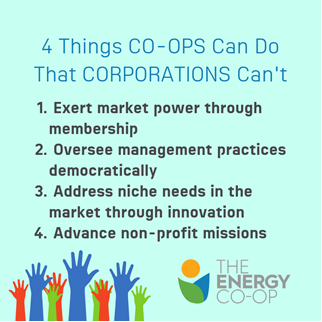
By Georgia Mae Lively 9/19/2019
Most people are probably already familiar with the concept of co-ops, likely due to the widespread success of food co-operatives—usually small, often organic, affordable grocery stores run by people who band together to buy their food in bulk to lower costs. But in reality, food co-ops are only one of the many types of businesses conducive to a co-operative model.
Co-operatives are, by definition, democratically owned and governed by the people they serve. This means there are no shareholders, and no one can purchase more decision-making power than anyone else. Instead, the people who benefit from the co-op’s services are in charge, and each member has equal influence over the organization’s management—one member, one vote. There are worker co-operatives, credit unions, school co-operatives, and, yes, even energy co-operatives. In fact, if it weren’t for the network of rural electric cooperatives across the country, people living in remote areas of the United States wouldn’t even have access to electric lighting, much less the internet.
Many small businesses in the US use the co-operative model, and some have even scaled up and expanded to become household names, like ACE Hardware, REI, Welch’s, True Value Hardware, and Land O’ Lakes. Whole Foods was once a food co-operative dedicated to providing its members with healthy organic food options.
The differences between businesses using a co-operative model and businesses using a corporate model permits co-operatives to remain mission-oriented while providing valuable, affordable services to their members. Here are just four examples of things co-operatives can do that corporations can’t:
- Exert market power through membership
- Members can band together at the grassroots level to buy in bulk from wholesale markets and lower individual costs, like at True Value and food co-operatives, and…
- …join together to sell—Land O’ Lakes, for example, is owned by a co-operative of dairy farmers who together sell butter and other dairy products to a larger client base.
- Oversee management practices democratically
- One member, one vote democracy. Unlike corporations, one person cannot purchase controlling blocks of stock.
- Business practices and procedures are open and transparent. Management reports to members.
- Address niche needs in market offerings through innovation
- Co-operatives are usually non-profit and focused on a stated mission, which makes them willing to provide goods and services to their membership because they are important—not necessarily because they are profitable.
- Rural electric co-operatives, for example, were established to bring electricity to a demographic that was previously overlooked by utilities.
- Corporations must maximize stockholder return, which makes them more risk-adverse in serving niche markets.
- Advance specific non-profit missions
- People often join or form co-operatives as a way of using their purchasing power to support causes or practices that are important to them.
- Whole Foods, for example, started as a food co-op and evolved to sell organic, responsibly produced foodstuffs. They and other food co-ops were the first to focus on organic, local products, and now, organic, local products are available in nearly every grocery chain.
Will co-operatives make corporations obsolete? Of course not. But because co-ops are non-profit and, therefore, can be mission-focused, they are an integral participant in our market economy by filling niche needs and leading innovation.